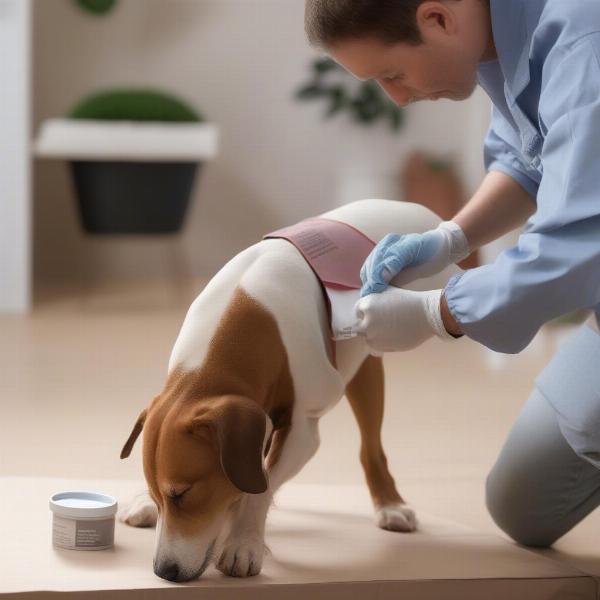Finding the right flea treatment for your dog can be overwhelming. With so many options available, both over-the-counter and from your vet, knowing which one is best for your furry friend can be confusing. This guide explores the world of vet flea treatment for dogs, helping you understand the benefits, different types, and how to choose the best protection.
Why Choose Vet Flea Treatment for Dogs?
While over-the-counter flea treatments exist, vet-prescribed options often offer more potent and targeted solutions. They are formulated to address specific infestations, considering factors like your dog’s age, breed, health conditions, and lifestyle. Vets can also advise on the best application method and provide personalized guidance to ensure the treatment is both effective and safe.
Types of Vet Flea Treatments
Veterinarians have access to a wide range of flea treatments, each designed with specific advantages. Some common types include:
- Oral Medications: These chewable tablets or pills offer systemic protection, killing fleas from the inside out. They’re convenient and often provide fast-acting relief.
- Topical Treatments: Applied directly to your dog’s skin, these solutions spread through the coat, killing fleas on contact. They are available as spot-on treatments, sprays, or shampoos.
- Flea Collars: Medicated collars provide continuous protection against fleas and sometimes ticks. They release insecticide slowly, offering long-lasting defense.
Choosing the Right Flea Treatment for Your Dog
Selecting the most suitable flea treatment depends on various factors. Your veterinarian will consider:
- Your Dog’s Age and Health: Puppies and senior dogs may require different treatments than adult dogs. Underlying health conditions can also influence the choice of medication.
- Severity of Infestation: A mild infestation may require a different approach than a severe one.
- Lifestyle and Environment: Dogs that spend a lot of time outdoors may need more robust protection.
- Presence of Other Parasites: Some treatments target multiple parasites, like ticks and worms, offering broader protection.
Administering Flea Treatments Safely
Always follow your veterinarian’s instructions carefully when applying any flea treatment. Incorrect usage can reduce effectiveness or even cause harm. Some key tips include:
- Wear gloves when applying topical treatments.
- Avoid bathing your dog immediately before or after treatment.
- Keep the medication out of reach of children and other pets.
- Monitor your dog for any adverse reactions.
 Applying topical flea treatment to a dog
Applying topical flea treatment to a dog
What if My Dog Still Has Fleas After Treatment?
If your dog continues to have fleas after treatment, consult your vet. They may recommend a different product, adjust the dosage, or suggest environmental control measures to eliminate fleas from your home.
Conclusion
Vet flea treatment for dogs offers a safe and effective way to protect your furry friend from these pesky parasites. vet flea treatment for dogs can significantly improve your dog’s comfort and overall health by preventing infestations and the diseases they can carry. By working with your veterinarian, you can choose the best treatment tailored to your dog’s specific needs. vet prescribed flea treatment for dogs is the best way to ensure your dog’s protection. Don’t hesitate to seek professional advice to find the right solution for your four-legged companion.
FAQ
- How often should I apply flea treatment to my dog? This depends on the specific product. Your veterinarian will recommend the appropriate frequency.
- Can flea treatments be used on pregnant or nursing dogs? Some treatments are safe for pregnant or nursing dogs, but it’s crucial to consult your vet before using any medication.
- What are the signs of a flea infestation? Excessive scratching, biting at the skin, hair loss, and small black specks (flea dirt) in the fur are common signs.
- Are there natural alternatives to vet flea treatments? While some natural remedies exist, they may not be as effective as vet-prescribed treatments, especially for severe infestations. Discuss these options with your vet.
- Can fleas transmit diseases to humans? Yes, fleas can transmit diseases like tapeworms and certain bacterial infections to humans.
- What can I do to prevent fleas in my home? Regular vacuuming, washing pet bedding, and treating the environment with flea sprays can help prevent infestations.
- Can my dog be allergic to flea treatments? Yes, some dogs can develop allergic reactions. Consult your vet immediately if you notice any unusual symptoms after treatment.
About ILM Dog
ILM Dog is your trusted international resource for all things dog-related. We offer expert advice on dog breeds, health, training, nutrition, grooming, and much more. From puppy care to senior dog support, we are committed to providing reliable, practical information for dog owners worldwide. Whether you’re a new dog owner or a seasoned expert, our comprehensive guides and resources help you provide the best possible care for your canine companion. We specialize in providing valuable information on vet prescribed flea treatment for dogs, amongst other essential health and care topics. For personalized guidance on choosing the right best flea treatment for dogs without a vet prescription uk or have other dog-related queries, please contact us at [email protected] or call us at +44 20-3965-8624. vet prescribed flea treatment for dogs uk ensures the best possible outcome for your furry friend.